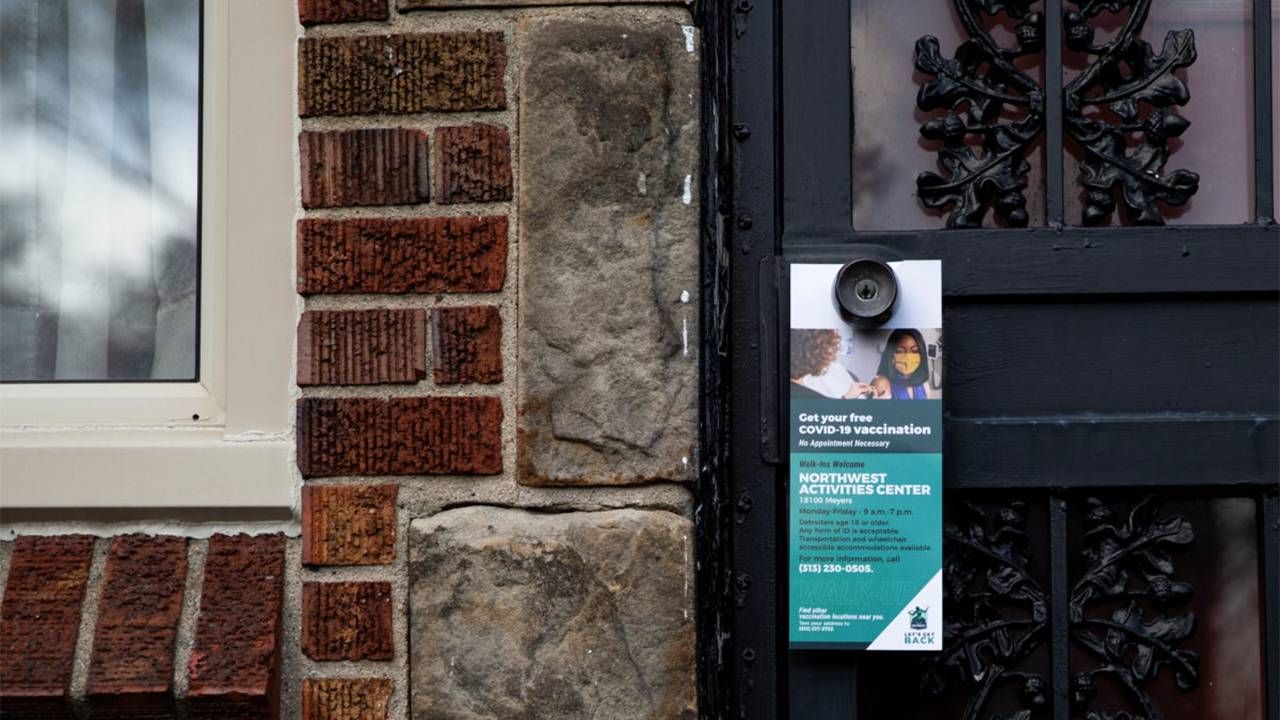What's Behind the COVID-19 Vaccine Hesitancy Among Muslim Americans
Why some are declining the COVID-19 vaccine for religious and historical reasons
By Tasmiha Khan | July 20, 2021 | Health
With more than 1.8 billion Muslims making up a quarter of the world's population, it is critical to explore why a segment of the Muslim population is exhibiting COVID-19 vaccine hesitancy, especially in the Muslim American community, and how that hesitancy is playing out.

COVID-19 vaccine location information is left behind on a door during door-knock campaign to help answer questions related to hesitancy around the COVID-19 vaccine in Detroit | Credit: REUTERS/Emily Elconin via PBS NewsHour
While vaccine hesitancy is present through the United States in differing degrees, there is limited data that breaks it down by religion.
Thus far, researchers have found that predictors of COVID-19 vaccine hesitancy overall include socio-demographics, co-morbidity factors and past experience of racial discrimination. During the short timeframe of the coronavirus vaccination campaign, even with the best of intentions, policymakers and public health practitioners will not be able to undo centuries of distrust based on unfair treatment experienced by specific segments of the population in health care, education, finance and safety.
Historical Concerns About the COVID-19 Vaccine
"Muslims have little trust in anything driven by government, corporate or media interests," says Daniel Haqiqatjou, a thought leader in Islamic discourse in the United States and founder of the Aslana Institute.
"There are questions as to whether it is halal or not because almost all vaccines are pork gelatin-based."
"Since 9/11, these 'experts' have come together to push a 'global war on terror' based on fear created by the false demonization of Islam and Muslims," he adds. "'Experts can be very wrong and countless people suffer. We've witnessed that firsthand."
Haquiqatjou says the false demonization of Islam and Muslims "is no surprise," because — as an American Psychological Association article noted — Americans' acceptance of Muslims has continued to deteriorate since 9/11.
Abu Ameen, a test engineer from California, has other reasons for vaccine hesitancy, which echo those of some other Americans.
"I'm not an anti-vaxxer, but I want to wait this one out," says Ameen. "I want to wait a year or so to see its immediate effects on people taking these vaccines."
For some Muslim Americans, getting the COVID-19 vaccine is mandatory because of their vocation, but they have religious concerns.
"I have a little different standpoint with this due to the fact I am a home caretaker of the elderly," says Aishah Holley-Clark from Pennsylvania. She is uncertain, however, about whether the vaccine is halal, or permissible according to Islamic guidelines.
"There are questions as to whether it is halal or not because almost all vaccines are pork gelatin-based, to keep them from going bad during packaging and delivery," she says. Pork is basically not halal.
In fact, some scholars in Asia have issued a ruling against the COVID-19 Chinese vaccine, because of it being not being permissible (halal), according to an article on the website of The Hastings Center, a bioethics research institute.
Dissenting opinions persist whether the vaccine is permissible within the Muslim community.
Consequently, as the Associated Press has reported, dissenting opinions persist whether the vaccine is permissible within the Muslim community. As a result, lay people are left to their individual choices.
When Next Avenue asked if Holley-Clark would have gotten the vaccine had she not been expecting a child, she said: "No, too many uncertainties just yet with it. I don't want to be a static number. I'd rather have solid testing and analysis on things before I get it. If I was behind bars, a vaccine wouldn't change the qadr (destiny) of Allah and I would not partake in their studies with it either."
Remembering the Tuskegee Experiment
Abdul Kabir Muhammad, an African American Muslim from Cincinnati who was formerly incarcerated, says he and members of his community have great resentment and distrust in America "for the atrocities they are guilty of in dealing with us like the Tuskegee experiment." (The "Tuskegee Study of Unrelated Syphilis in the Negro Male" was an ethically abusive study conducted by the U.S. Public Health Service and the Centers for Disease Control and Prevention between 1932 and 1972.)
He further explains how some leaders in the Black community are also in opposition. "They are vehement that the reason Black people are more susceptible to COVID is directly linked to our history of oppression in this country," says Kabir Muhammad. "And yes, this all affects me being Muslim, sadly because in this country my skin color is my class."
While COVID-19 vaccine rates vary across the country for the Muslim community, there have been numerous outreach programs from mosques, community centers and trusted community leaders such as imams aimed at dispelling inaccurate information about the vaccines and promoting vaccinations. This has led some Muslims to get coronavirus vaccinations.
Editor’s note: This article is made possible with funding from the NextFifty Initiative.
Tasmiha Khan has her MA in social impact and uplifts marginalized communities through her writing. She has published in National Geographic, The New York Times and Vanity Fair among others. Follow her @CraftOurStory to learn more. Read More